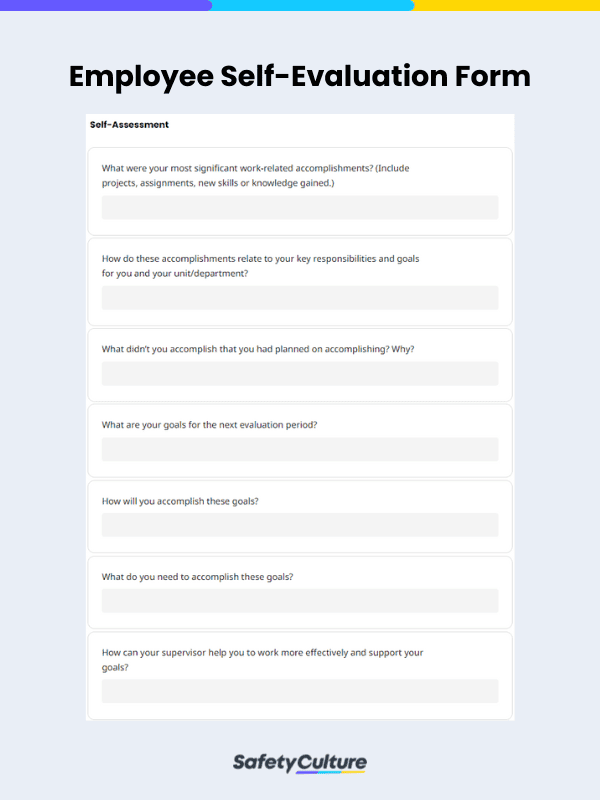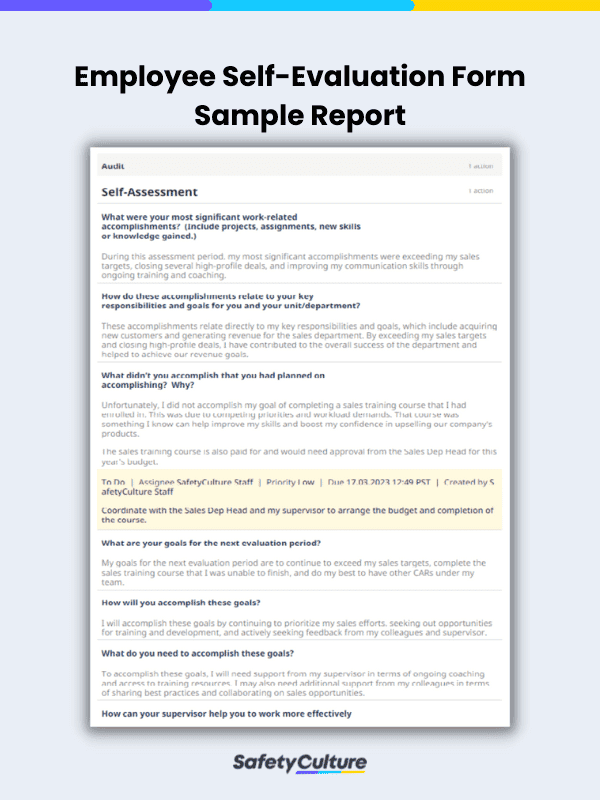What is an Employee Self Evaluation Form?
An employee self-evaluation form is a tool that allows employees to assess their own job performance, accomplishments, strengths, weaknesses, and areas for improvement. Usually, it’s part of the performance review process and is completed before the actual review meeting with the manager or supervisor.
The employee self-evaluation form usually consists of a set of questions that covers various aspects of the employee’s job performance and goals. These employee self-evaluation questions can range from rating one’s own performance on specific job tasks to describing significant accomplishments and improvement opportunities.
Importance and Benefits of Using One
Using an employee self-evaluation form is essential for both the employee and the employer for various reasons. It’s a tool that employees can use to aid their efforts to review and reflect on their work performance to identify strengths and areas for improvement. Also, employees can refer to the form when setting goals and developing a plan for their personal and career development.
For employers, completed employee self-evaluation forms provide insight into how workers perceive how they perform in their roles, where they excel, and where they can improve. Ultimately, these insights are useful for determining employee training needs, career development opportunities, and aspects where the organization can improve.
Other benefits of using and completing an employee self-evaluation template include the following:
- Increased productivity
- Improved employee satisfaction
- Streamlined goal-setting
- Enhanced employee self-awareness
What is Included in an Employee Self Evaluation Template?
To ensure that every aspect of employee self-evaluation is covered in your form, include the following basic details and sections:
- Title Page – employee details, including name, employee number, job title, and supervisor name
- Self-Assessment – open-ended questions regarding your work accomplishments, goals, things that went well, and your next steps
- Completion – feedback or suggestions for team improvement and sign-off
How to Write a Good Employee Self Evaluation
As an employee, it’s important to understand how to fill out a self evaluation template. This is a crucial component of your performance review process, as it provides an opportunity to reflect on your achievements, areas for improvement, and career goals.
Now, what do you write in an employee self-evaluation? To help you complete this form, follow these steps:
1. Review the evaluation criteria.
This is to help you understand what it’s specifically for. The evaluation criteria may include specific job duties, performance metrics, or other goals outlined by your supervisor. Make sure you understand what’s expected of you and how you’ll be evaluated. If you have any questions or concerns, don’t hesitate to ask your supervisor, manager, or Human Resources (HR) representative for clarification.
2. Gather supporting documentation.
To ensure your self-evaluation is accurate and comprehensive, gather supporting documentation such as project reports, customer feedback, and performance metrics. These will provide concrete evidence of your achievements and help you identify areas for improvement. Also, it can help demonstrate to your supervisor that you’re committed to working on your performance.
3. Reflect on your performance.
Take the time to reflect on your performance over the evaluation period. Consider your strengths and weaknesses, as well as any challenges you faced, how you overcame them, and how you plan on mitigating them as much as possible. Most importantly, be honest with yourself and avoid being overly critical or too self-congratulatory.
4. Write your self-evaluation.
Start by outlining your accomplishments, being as specific and detailed as possible. Use your supporting documentation and data to provide examples of your achievements, areas for improvement, and the specific steps you plan to take to address them.
FAQs About Employee Self Evaluation Forms
Employees unsure of how to complete it should reach out to their manager or HR representative for guidance. Also, employees may consider reviewing their job description, performance metrics, and previous performance evaluations to ensure they have a clear understanding of their job responsibilities and expectations. This way, they can effectively complete the employee self-assessment form.
The frequency of completing an employee self-assessment template may vary depending on the organization’s policies. Some may require it annually, while others may require them to be completed quarterly or bi-annually. Employees must check with their manager or HR department to determine the frequency of self-evaluations in their organization.
While it can’t be used as the sole basis for salary adjustment decisions (as many other factors must be considered), completing an employee self-evaluation form can help employees articulate their achievements and contributions, which may strengthen their case for a salary increase.
Managers can use the employee self-evaluation template to gain insight into their employee’s performance and competencies, which can help in setting goals and creating development plans for the upcoming year. After reviewing the employee’s self-evaluation, managers can schedule a meeting to discuss their feedback and provide additional support and follow-up actions.




